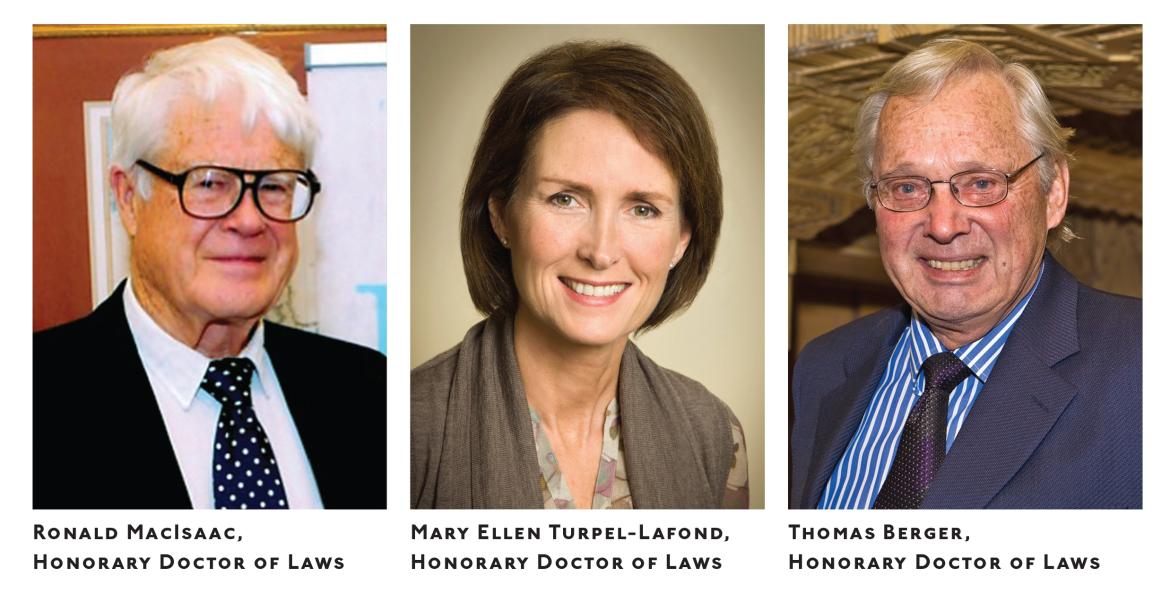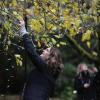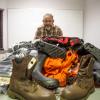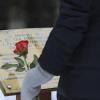
May 28, 2013 - 5:45am
Three prominent lawyers with exceptional records of distinction in legal affairs and a passion for helping to improve the lives of Aboriginal peoples in BC and Canada will receive honorary Doctor of Laws degrees from Vancouver Island University at spring convocation ceremonies June 3 and 4 at the Port Theatre in Nanaimo. Here are biographies on each recipient:
Thomas Berger – Honorary Doctor of Laws – June 3, 2:30 pm ceremony
Thomas Berger, one of Canada’s pre-eminent legal figures and human rights advocates for more than 40 years, was the youngest judge appointed to the Supreme Court of BC in the 20th century. Berger’s life-long advocacy on behalf of Aboriginal people began here in Nanaimo when, as a young lawyer, he argued an important case in 1963 called Regina v. White and Bob. Berger defended two young men from the Nanaimo Indian Band (today known as Snuneymuxw First Nation) who were charged with hunting out of season. The case went all the way to the Supreme Court of Canada and, in 1965, the Supreme Court affirmed their right to hunt under a treaty made at Nanaimo in 1854.
The case had important ramifications because it successfully resurrected the Douglas Treaties that the government of the colony of Vancouver Island had signed with First Nations on Southern Vancouver Island in the 1850s. Berger also argued the landmark case of Calder v. B.C., (the Nisga’a case) in which the Supreme Court of Canada for the first time declared that Aboriginal title was recognized in Canadian law.
Appointed to the Supreme Court of B.C. in 1971, Berger served on the bench until 1983. He is perhaps best known for his work as Commissioner of the Mackenzie Valley Pipeline Inquiry in 1974-1977. On his recommendation, the Government of Canada rejected the Arctic Gas pipeline proposal, established wilderness parks in the Northern Yukon, and agreed to a moratorium on major development in the region until Aboriginal land claims in the Mackenzie Valley had been settled.
Berger also made headlines when he resigned his seat over the reversal of the decision to include Aboriginal and treaty rights in Prime Minister Pierre Trudeau’s repatriated Constitution. Berger’s stand was instrumental in persuading Trudeau and the premiers to reinstate Aboriginal and treaty rights in the new Constitution adopted in 1982.
He headed the Alaska Native Review Commission from 1983-1985, and was vice-chairman of the World Bank’s Sardar Sarovar Inquiry in India in 1991-1992.
Now 80, Berger continues to practise law in Vancouver. In March, 2013, he was successful on behalf of the Manitoba Métis Federation in persuading the Supreme Court of Canada to declare that the promises of land that John A. Macdonald’s government had made to Louis Riel in 1870 had not been fulfilled.
Berger holds honorary degrees from 13 universities, received the Order of Canada in 1990, was granted the Freedom of the City of Vancouver in 1992, and in 2004 was awarded the Order of British Columbia.
Ronald MacIsaac - Honorary Doctor of Laws – June 4, 10 am ceremony
Ronald MacIsaac, a prominent Vancouver Island lawyer since 1949, has enjoyed a long career combining his passionate commitment to social justice, service to others and reverence for the natural world.
MacIsaac, a lawyer with the highest number of years of continuous practice in BC, founded a firm in Nanaimo that has flourished for more than six decades. He has tried cases at all levels of court in BC as well as in the federal courts, and tried immigration applications in India, Hong Kong, Jamaica, Colombia and other countries. MacIsaac was also instrumental in the revival of civil juries in British Columbia for injury cases.
Working for a just and humane society has always been part of his life. MacIsaac has extended legal services to those in need, and established pro bono legal clinics and promoted pro bono work among his legal colleagues. He has embraced and worked with the Aboriginal community as a founding patron of the Aboriginal Law Students Scholarship Fund and a member of the boards of the Metis Association and the Caring for First Nations Children Society, and has been a firm supporter of equal rights for women. In the 1950s, he became the first and only male member of Voices of Women, a group committed to helping organizations around the world that are working to help women and children in dire conditions.
Many other organizations have benefited from MacIsaac’s time and expertise including the Vancouver Island Rights Coalition, Together Against Poverty, Mothers and Others Against Drunk Driving, the Victoria Child Sexual Abuse Association and the Canadian National Institute for the Blind.
MacIsaac’s work on the landmark trials of the Clayoquot anti-logging protesters was followed up with a book and an international tour to promote the protection of old growth forests and the biodiversity they represent.
As a philanthropist, MacIsaac has generously supported arts, education and environmental organizations. One of his significant early achievements was to work with others to establish a law foundation for the charitable use of money generated by trust account interest payments. This idea has now become standard practice across North America. He is also a gold sponsor of Ducks Unlimited.
MacIsaac’s past honours include the Rankin Pro Bono Award, the Queen’s Golden Jubilee Medal, the Canadian Bar Association Community Service Award and the International Law Education Society Medal.
Mary Ellen Turpel-Lafond – Honorary Doctor of Laws, June 4, 2:30 pm ceremony
Vancouver Island University recognizes Mary Ellen Turpel-Lafond for her extraordinary humanitarian and public contributions to fostering awareness and understanding of the challenges and needs affecting vulnerable children in Canada.
Turpel-Lafond, a member of the Muskeg Lake Cree Nation, was appointed British Columbia’s first Representative for Children and Youth in November 2006. She is on leave from the Saskatchewan Provincial Court, where she was the Administrative Judge for Saskatoon.
Turpel-Lafond was the first Aboriginal woman to be appointed to the Saskatchewan bench in 1998, and actively involved in projects relating to access to justice, judicial independence, and public outreach.
She has also worked as a criminal law judge in youth and adult courts, with an emphasis on developing partnerships to better serve the needs of young people, particularly sexually exploited children and youth, and children and youth with disabilities, such as those who suffer from fetal alcohol spectrum disorder.
Prior to her judicial appointment, Turpel-Lafond was a lawyer in Nova Scotia and Saskatchewan and a tenured professor of law at Dalhousie University, Faculty of Law. She also taught law at the University of Toronto, the University of Notre Dame and other universities.
As a practising lawyer, she appeared before all levels of Courts in Canada, including the Supreme Court of Canada. She has worked on land claims with the Indian Law Resource Centre in Washington, D.C, and served as a key legal and constitutional advisor to Aboriginal leaders.
Turpel-Lafond, who holds a doctorate of law from Harvard Law School, received the distinction of ‘Indigenous Peoples’ Counsel’ from the Indigenous Bar Association in 2007. As well, Time Magazine has twice bestowed honours upon Turpel-Lafond, naming her one of the ‘100 Global Leaders of Tomorrow’ in 1994, and one of the ‘Top 20 Canadian Leaders for the 21st Century’ in 1999.
Ms Turpel-Lafond, her husband George Lafond, Treaty Commissioner for Saskatchewan, their son and three daughters live in Victoria, B.C.
-30-
MEDIA CONTACT
Janina Stajic, Manager, Vancouver Island University
P: Error! Hyperlink reference not valid. E: Communications@viu.ca Twitter: @VIUNews
Tags: In the Community






